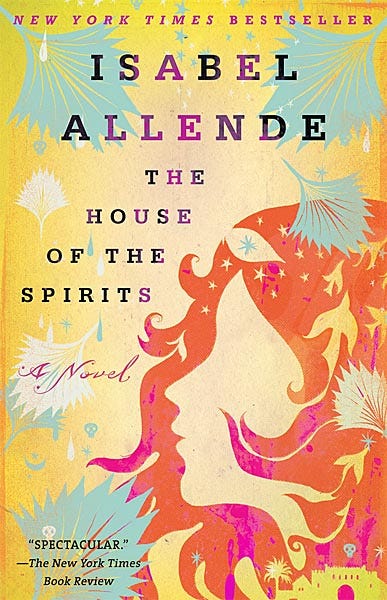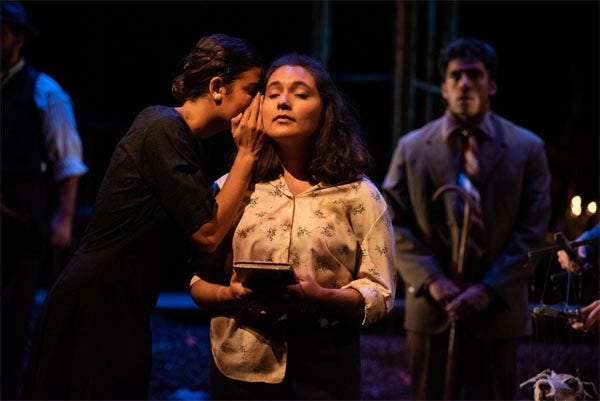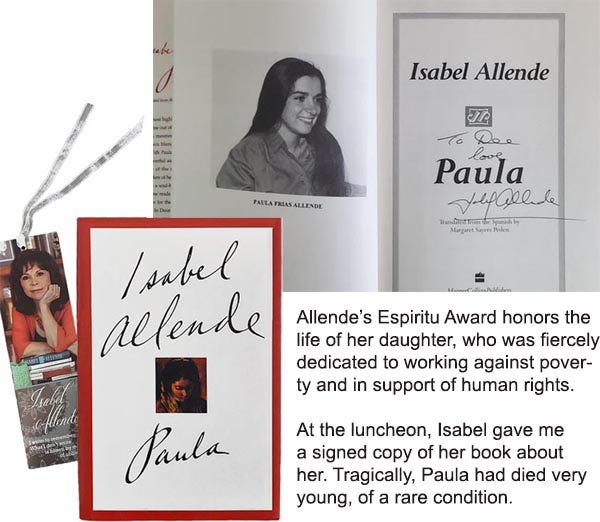This is not so much a Postcard post as an SOS note in a bottle that I’m tossing out into the ocean of Substack readers. Let me reassure you, it’s only about a book. I’ve just finished Isabel Allende’s novel, The House of the Spirits.
All by itself, I could have dealt with the story of the Trueba family in Chile from 1910 through the military coup in 1973, as distant history. But it’s more complicated than that; at the same time, I’ve been absorbing the daily national headlines online.
Together, the novel and the news have been quietly weaving a web, and I’m caught in it. It’s a tangle of the magical and the real, of the past somewhere else and the present right here.
Such a close, personal view into tragic events is upsetting, and it should be. Allende knew that when she wrote this book. She has said,
Everything changes when you can personally relate to something. Literature makes us see things from an angle we had never expected. That is why literature will always exist.
The House of the Spirits is captivating. Allende’s descriptions sparkle with bits of magic realism that really do fill this great house of a book with protective spirits. In the end, the character named Clara may be gone, but the spiritual world she created for her daughter and granddaughter lingers.
All through the book, I read about women working hard to counter the effects of vicious power struggles being played out by the men.
And then, I glance up at the news on my computer and see the same power struggle going on now. It’s threatening to cover the earth, and I yearn for a woman’s nurturing influence. Understand, I’m not saying there are no nurturing men, and Allende wouldn’t say that either.
Still, no matter how well-written a book is, when the subject matter is difficult you have to make a decision whether to keep reading or not.
This wasn’t the first time in my life I tried to read The House of the Spirits. And again, dear reader, this time, halfway through the book I impulsively returned it to the library. That day I just couldn’t bear a vivid character’s fictional cruelty because it seemed to amplify the reality of what’s going on in the world today, beyond my endurance.

Then a friend of mine, Dee Redwine, said something to me about Allende’s subject matter that inspired me to go to the library and check the book back out again. She told me,
Isabel’s books are not easy reads. She has lived through brutality that is not comfortable to confront. Frankly, most of the world’s women live surrounded by casual cruelty. But we cannot close our eyes to this reality, if only to steel our resolve to march forward towards justice.
This reminds me of a line from The House of the Spirits. I think it was Clara who said to her daughter Blanca, when they volunteered to help people in need,
This is to assuage our conscience, darling. But it doesn’t help the poor. They don’t need charity; they need justice.
Dee has worked in Latin America for justice. She said,
Isabel is a global feminist - as am I. We are all part of an interconnected web of people who are fighting for a better world, where everyone can live their lives freely, determining their own path to happiness.
We are the beneficiaries of those who came before us and fought for our rights and freedoms, and we should all take the responsibility seriously of ensuring a better future for those who come after.
My friend Dee met Isabel Allende in 2013 in New York City, when Allende presented her Espiritu Award to Planned Parenthood in recognition of their outstanding work on behalf of women’s and girls’ rights worldwide. Dee says,
As the leader of Planned Parenthood’s Latin America program, I attended the luncheon to receive the Award.
We were able to chat with Isabel over lunch, and heard about her passion for advancing women’s rights, lifting women’s voices, and ensuring that women’s stories are told. This is reflected in her writing as well, as women are often the engines driving her novels.
I asked Dee what it was like to meet Isabel Allende. She said,
Isabel was warm, funny, approachable, and very earthy. While very petite, she had a boisterous sense of humor.
She also asked very thoughtful questions about our work in support of the women’s rights movement in Latin America, and the contrast with the U. S. Isabel was dismayed that we were still fighting for women’s basic human rights to dignity and self-determination.
Isabel’s dismay in 2013 hits me like one of today’s news headlines. But there’s also the spirit for personal action in knowing that people like Isabel and Dee are organizing ordinary people to keep fighting for justice everywhere.








Wise words from wise women! Dee is another of a string of amazing people I have met since moving here!
Thank you for an inspiring review - and for your honesty about how hard it is to read some material. Many times I have had to check out a book two or three times in order to have the strength to finish it because the information was so upsetting even though important.